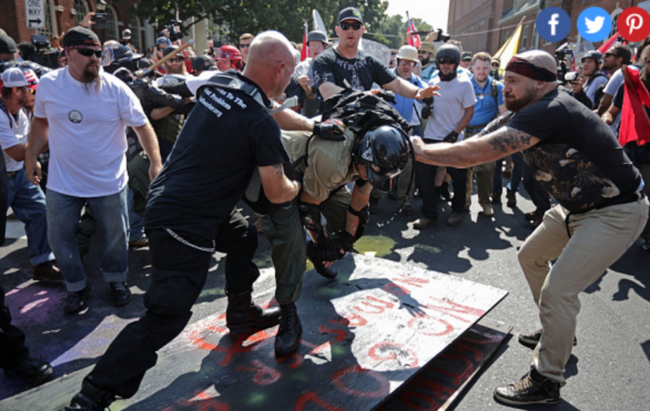“I am large…I contain multitudes.”
That’s Walt Whitman, singing a vision of America that is diverse, paradoxical and unshakably unified in its regard for the equality and beauty of every human being.
The America recently on display in Charlottesville is a far cry from Whitman’s. President Trump’s response to the tragic events made this especially clear:
“We condemn in the strongest possible terms this egregious display of hatred, bigotry and violence, on many sides. On many sides.”
Mr. Trump had a chance to at last unequivocally reject white supremacy, neo-Nazism and white nationalism—as well as hatred and bigotry of all sorts. He did not.
More important, Mr. Trump could have sent a much-needed message of unity, tolerance and love to the American people by making it clear that this country will not entertain hate as valid or acceptable under any circumstance.
Mr. Trump’s second response to Charlottesville, in which he did specifically renounce the “KKK, neo-Nazis [and] white supremacists” as “criminals and thugs” did little to make up for his long-delayed and inappropriate response.
He was tepid at best and insultingly passive at worst, and those who see this obviously canned speech—likely forced on the President by his advisors—as something to be happy about are fooling themselves.
The President’s remarks, given at Trump Tower on the 15th, confirm the hollowness of his renunciation.
There is no such thing as the “alt-left,” a phrase Mr. Trump used to imply equivalence between the Unite the Right demonstrators and the counter-protesters who rallied against them.
If the anti-racist protesters were in fact violent, that is something we should talk about. But Mr. Trump’s reversion to the vague generalization of “on both sides!” over-simplifies the situation and erases fundamental differences between the two groups. There is simply no equivalence in this case.
The Unite the Right demonstrators proudly espouse a hateful, racist, white-supremacist and anti-semitic ideology. They draw on a tradition of hate and racial violence with conspicuous roots in slavery, and represent a uniquely American species of evil that we have as of yet failed to eradicate.
The counter-protesters, on the other hand, came from across the political spectrum. They by no means represent the ideology of the radical left—they represent ideas that ought to be supported by all Americans.
They were united against hatred, bigotry and racial violence. They courageously took a stand against hate—hate our President is clearly not all that troubled by. One of them lost her life and 19 others were injured.
Perhaps most striking about Mr. Trump’s various comments were his calls for unity—no doubt many of his supporters will applaud him for his apparent dedication to closing partisan, racial and other divides in this country. I wish I could do the same.
The thing is, Mr. Trump talks about unity the way he talks about everything. For the President, national unity is an order issued from on high which he expects to be magically carried out by his inferiors—in this case, the American people.
Trump is used to having things his way. He is notoriously sensitive about his popular perception, and demands not just loyalty but also flattery from his advisors.
The problem is that uniting this country will take work that Donald Trump does not appear willing to do. He can issue all the vague, simplistic and absolute orders for immediate change that he wants, but that change will not happen unless he takes serious and legitimate action toward facilitating it.
What is truly “sad” is that Mr. Trump had the chance to begin taking that action. Simply calling out white nationalist terror—in a more sincere way—for what it is would have gone a long way toward uniting the country against a home-grown, serious and legitimate enemy.
Mr. Trump, however, refused his opportunity. In so doing, he furthered the divide in this country and rendered his comments about American unity laughable at best and pitiful at worst.
The President is perhaps right about one thing, however: this can and should be a time for national unity. Unity, first, in the spirit of love for our fellow people.
But also unity in opposition to a President who is malignantly complacent in the face of white domestic terrorism. Trump supporters—indeed, all people—who do not consider themselves radical racists should have no qualms calling the rioters in Virginia exactly what they are. In this way, we may truly be united in these dark days.
Those who cannot openly condemn the rioters—or the President who knowingly benefits from their support and, in his complacency, supports their cause—should think long and hard about their own moral identity and integrity.
History is being made, here and now, whether or not we are willing to admit it—and history remembers cowards with the ignominy they deserve.









